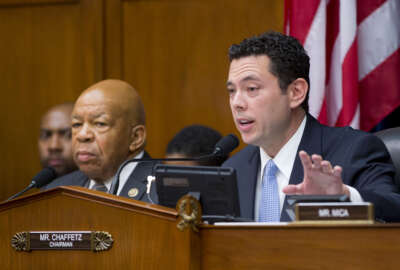
Postal Service reports $5.6 billion loss for fiscal 2016
The U.S. Postal Service, having faced years of financial hardship, posted a $5.6 billion net loss for fiscal 2016, despite an increase in revenue this year.
The U.S. Postal Service, having faced years of financial hardship, posted a $5.6 billion net loss for fiscal 2016, despite an increase in revenue this year.
USPS reported $610 million in controllable income this year, down from $1.18 billion in FY 2015.
Controllable income, which adjusts for compensation costs outside of USPS’ control, excludes the $5.8 billion the agency paid to pre-fund postal workers’ retirement benefits. Since 2006, the Postal Service has been required by Congress to pre-fund retiree health benefits.
Without the pre-funding mandate, the Postal Service would have recorded a net income of about $200 million in fiscal 2016.
Postmaster General Megan Brennan urged the lame-duck Congress on Nov. 15 to pass postal reform legislation in the months remaining until President-elect Donald Trump takes office.
“The leaders of our oversight committees in the House and Senate have been advocates of postal reform. We urge the 114th Congress to make postal reform a priority in these remaining weeks. There is still time to get an effective, bipartisan bill passed in this Congress,” Brennan told reporters.
In July, the House Oversight and Government Reform Committee passed two postal reform bills that would, among other things, integrate USPS’ health benefits program with Medicare and remove the financial burden of pre-funding those benefits.
Sen. Tom Carper (D-Del.), ranking member of the Homeland Security and Governmental Affairs Committee, introduced postal reform legislation last year that would also eliminate the pre-funding mandate.
“The news that, despite rises in revenue, the U.S. Postal Service is reporting significant losses in 2016 should not come as a surprise to anyone. Quarter after quarter, year after year, these reports reaffirm the obvious — that without Congressional action, the Postal Service will remain unable to raise enough revenue to cover its costs and will continue to suffer losses that threaten its long-term viability. It is long past time that Congress comes together to finally address the Postal Service’s dire situation and chart a new course for this critical institution once and for all,” Carper said in a statement Wednesday.
The National Association of Letter Carriers, one of the largest postal workers unions, reiterated its support for postal reform legislation.
“The pre-funding issue can be readily addressed if Congress acts on practical, targeted postal reform. There is a strong consensus within a coalition consisting of the Postal Service, postal unions, businesses, mailers and industry groups, as well as key legislators, for a reform package that all stakeholders can buy into, including addressing pre-funding, allowing USPS to use its invaluable networks for some new products and services, and adopting best private-sector practices in investing the USPS retiree health benefits fund,” NALC President Fredric Rolando said in a statement.
Overall, USPS reported $70.4 billion in revenue in FY 2016, a 2.3 percent increase from last year. However, that figure excludes the $1.1 billion USPS lost this year when the Postal Regulatory Commission rolled back an emergency postal rate increase that had been in place since the 2008 recession.
In April, the PRC rolled back the price of a U.S. postage stamp from 49 cents to 47 cents. Without the postal rate surcharge, USPS estimates it will lose about $2 billion in revenue annually.
Since the postal rate rollback, Brennan has called on the PRC to raise the rate back up to 49 cents.
“Despite the overall revenue growth, the positive controllable income and aggressive management of the business, the Postal Service cannot overcome our systemic financial challenges without legislative reform and changes to our pricing system,” Brennan said.
On Nov. 14, the PRC recommended to President Barack Obama and Congress that they consider postal reform, especially with regards to the pre-funding mandate.
“It is clear, the most important legislative recommendations the Commission can make relate directly to improving the financial condition of the U.S. Postal Service. It is our hope that these recommendations will be the foundation for that effort,” PRC Acting Chairman Robert Taub said in a statement.
The Postal Service saw a 15.8 percent increase in shipping and packaging in 2016, earning more than $2.4 billion in revenue, thanks largely to its major stake in e-commerce delivery.
“The Postal Service continues to win e-commerce customers, grow our package delivery business and win market share. In fact, no other shipper delivers as many e-commerce packages to the home,” Brennan said.
This holiday season, USPS expects to deliver 16 billion pieces of mail, including 750 million packages.
Copyright © 2025 Federal News Network. All rights reserved. This website is not intended for users located within the European Economic Area.
Jory Heckman is a reporter at Federal News Network covering U.S. Postal Service, IRS, big data and technology issues.
Follow @jheckmanWFED





